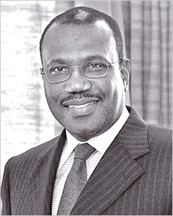‘Great revolution in mobile penetration in SL’
Rasika SOMARATHNA
The International Telecommunication Union (ITU)
has been helping developed and developing countries with a host of
communications issues for 145 years. Its mission is to enable the growth
and sustained development of telecommunications and information
networks, and to facilitate universal access, so that people everywhere
can participate in, and benefit from the emerging information society
and global economy.
Here, Secretary-General Dr. Hamadoun Toure
who was in Sri Lanka to participate in the 12th Global Symposium for
Regulators, shared his thoughts on the importance of the event, Sri
Lanka’s growth in the ICT sector, broadband, the increasing threat of
cyber crime, innovation driven by necessity, and how the private and
public sectors can work together to create the knowledge society of the
future.
|

Dr. Hamadoun Toure |
Q: How has the GSR 2012 has progressed so far and what are its
aims?
A: This is the annual gathering of regulators and their
industry dialogue. This is a very important event for the global
telecommunications regulatory community - and an equally important event
for the development of information and communication technologies
worldwide. It is the decisions that are made by national regulators that
shape the market for the growth of information and communications
services.
Today Mobile penetration is quite widespread and now our focus is on
how to turn this mobile miracle into a broadband miracle. GSR 2012 has
produced very encouraging deliberations in this regards.
These are top level regulators from over 100 countries. They share
good experiences and bad experiences. Our philosophy is very simple. We
are in this information society. When we share information it
multiplies. It gets divided. It is the beauty of this society and ITU's
task is to supplement this.
We like to see everybody emerge as winners. We want to ensure that
everybody shares the right information. In this field there is no
concept as a big country or small country, all are equal. Because
technology and the challenges that come with it are new to everyone.
Even a small country can come up with new an innovative concept which
others can adopt.
The Director of the Development sector of ITU in this conference has
added a new dimension called GRID - the Global Regulators Industry
Dialogue. The GRID includes the heads of private sector, CEOs, heads of
regulators in the companies and government agencies. It is bringing like
all players together and determine what can be done to make the game
more fun.
We also have to ensure that the game is fare and winning for
everyone. Regulators are the referees. However people come to watch the
players, without the players there will be nothing. You don't need a too
visible referee, because it would ruin the game. However, if there is no
referee also the game will go out of control. So our idea is to strike
the right balance.
For example ICT is the only industry which did not get affected by
the economic crisis. This is because there is good regulation and not
heavy handed regulation. The financial sector collapsed due to total
lack of regulation. This is the difference. We try to exchange best
practices and strike a balance on how to regulate.
Q: What are your views on the growth of the ICT sector in Sri
Lanka?
|

Increasing threat of cyber crime |
A: In Sri Lanka great a revolution in mobile penetration has
taken place. In 2006, the mobile penetration was 27 percent and by end
of 2011 mobile penetration has increased to 87 percent. This is a
tremendous growth. Also 3G technologies were introduced here ahead of
all other countries in the Asian region. Today trials are going on for
next generation of mobile communication. We believe that there is a very
conducive environment for competition here. Competition, innovation and
private sector are the key drivers of this industry today.
Sri Lanka's positive ICT developments is a clear indicator of the
success in plans and strategies adopted by the government as part of its
vision of making Sri Lanka one of Asia's digital star performers and an
important new regional knowledge hub.
Strong competition among mobile service providers has already pushed
the mobile broadband prices to a very low level. Also the government has
been very pro-active in preparing a national broadband policy to support
the delivery of high speed services, not just to well-off city dweller
but also for marginalized groups.
We also can see how ICT has helped in the rebuilding of the Northern
part here which was ravaged by the longest war in the world. Now they
are reaping the peace benefits. All can see the difference which has
happened in this country in just three years.
Q: How would you describe the ties between the ITU and Sri
Lanka over the years?
A: The ITU has enjoyed fruitful cooperation with Sri Lanka.
Together we have completed a number of projects successfully and many
are now underway. In 2007, we assisted in launching a national emergency
telecommunication plan and a workshop on communication during disasters.
In 2008, we helped in the coordination for a satellite. In 2008, I
visited here. At the time we really appreciated what President Mahinda
Rajapaksa was doing here for the ICT sector. The ITU awarded him the
Silver medal in recognition of his efforts.
The results of these efforts are there for everybody to see today.
This is why that we see the competition going well here. Without
political support telecommunications sector won't survive. This is very
important in this sector. When I met the President this time I asked him
to lend the same support for the growth of broadband penetration. It is
still low here but the good news is it is higher than the international
average. The LTE is being tested here which is next generation. We had
also a special programme here to train Judges to help them understand
better when confronting challenges related to the ICT. We also had a
workshop on NGN here.
Another salient programme we have jointly collaborated is the school
connectivity project which has been a big success. We had a preliminary
project at 25 schools. It was so successful that the government has
decided to implement it nationwide. In fact this we submitted six weeks
ago at the sessions of the programme committee in New York. We believe
that Sri Lanka could be seen as a case country for other countries to
learn from.
Q: Can you elaborate more on this school connectivity
programme?
A: This the first time we have done such a large preliminary
project here. We chose 25 schools in the Southern province for the
purpose whilst establishing an ICT laboratory in each of them. It has
been so successful, the government has decided to take it countrywide.
We look at countries which are serious and where funds will not be
misused. We need real implementation. We are one organization which
ensures that when we buy equipment for a project that they stay in the
relevant country 100 percent. When a country is put on a special
programme we also inform other UN organizations to implement their
programmes in that country as well.
There is a long queue of countries vying to be included as
beneficiaries, so we need to ensure that the monies will go in the right
way. So far we have been very satisfied with Sri Lanka on the schools
programme. In addition we also have been impressed by their growth and
commitment to the further progress in the ICT sector. This is why we are
holding this global gathering here.
Q: What are the challenges that you see when reassigning
analog spectrum into digital and other emerging technologies and also
your thoughts on cyber security?
A: The first challenge emerges when moving from one society to
the other which here is from analog to digital. When a child is learning
now he is open to Internet, twitter, face book, television etc at the
same time. First this is a cultural change. For this change to happen
you need to have leadership who dares to dream and share it.
We are in an industry which is profit making. Private sector can make
profits anywhere. The smallest island in the world is profitable. Once
you have the vision you have to put a legal and regulatory framework.
That is where authorities like TRC will make a big difference.
Regulators have to monitor three aspects, first prices going down,
second service going up and third coverage expanding. If any of these
are not going the right way it is time to bring in another player and
enhance competition.
These are some of the few challenges. We all have to deal with new
social networking which comes with enhanced ICT.
On Cyber security I think this is one of the greatest challenges that
humanity is facing. Given the importance of our access to information
and communication technology, the safety of our networks becomes a high
priority. Cyber crime is on the rise and it's placing a huge burden on
governments and the industry alike.
A cold war is starting now in cyber space which is a big challenge
for us because cyber space has no borders, a criminal can act from
anywhere in the globe. In 2007, in my first year as Secretary-General, I
put in place what I call the Global Cyber security Agenda (GCA).
I had a team comprising the key cyber security experts from top
companies around the world, both private and public sector, and they
came out with a recommendations. One is a legal and regulatory
framework, including the ethical side of cyber crime.
We need to have a common understanding of those issues because,
unfortunately, due to cultural differences, sometimes crime is defined
differently in different countries. Second is the technical arena. Of
course there are always technical tools to fight criminals, but
criminals are using technical innovation to do more sophisticated crimes
and that's how cyber threat technology actually evolves; it's the fight
between good and evil. Fortunately, good always wins in the end, but we
have to work very hard. Unfortunately one of the prime targets of these
efforts is children. We need a framework to protect children in this
regard.
The final and scariest challenge is that we see potential for a cyber
war. I hope I'm wrong, but a next world war may well start on the Net,
in cyberspace. Cyber war is not occurring right now, but we have seen
some malware being developed by some countries against others. Cyber
threats can reach parts of a nation where physical threats cannot.
Attacks on critical infrastructure can stall a country's progress and
quickly cause civil unrest. Cyberspace is driven by innovation and,
unfortunately, the concept of a super power no longer exists in the way
it did before; every individual on the planet can be a potential super
power and can make an attack that can be lethal.
Cyber threats have to be taken very seriously and that's why we
urgently need to put in place a platform for global cooperation and
coordination. This is why I am talking about a cyber peace treaty with
the involvement of all the countries in the world. In this treaty we
should commit to grant access to citizens, commit to protect them and
three commit to not to attack another country and four work in a
framework of global cooperation. |





